Joanne Lee Molinaro opens up about her journey from lawyer to food creator with nearly 5 million fans across social media
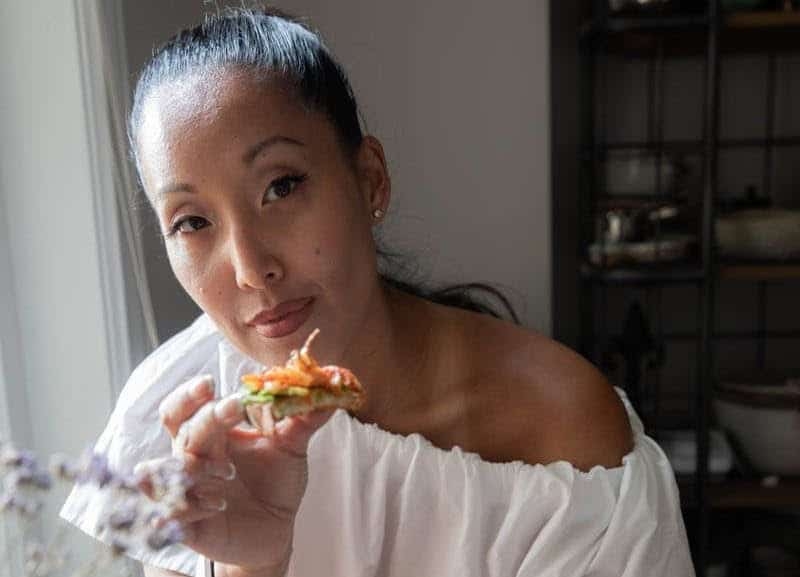 Joanne Lee Molinaro, a Korean American TikTok star with 3 million followers known as “The Korean Vegan,” shares video recipes introducing vegan cuisine inspired by traditional Korean food and powerful personal stories. (Joanne Lee Molinaro)
Joanne Lee Molinaro, a Korean American TikTok star with 3 million followers known as “The Korean Vegan,” shares video recipes introducing vegan cuisine inspired by traditional Korean food and powerful personal stories. (Joanne Lee Molinaro)
Over a basin of salted napa cabbage, a woman throws in a handful of spicy red seasoning and mixes it with gloved hands. The sound of leaves rubbing and sauce squelching soon fills the kitchen.
Her hands never stop, even as she begins to speak — not about cooking, but about friendship.
“You’re gonna get dumped. Not by your boyfriend. Not by your girlfriend or your fiance or your spouse,” she says.
The red seeps deeper into the cabbage as she makes kimchi, Korea’s traditional fermented vegetable dish, and so does her story into the hearts of viewers.
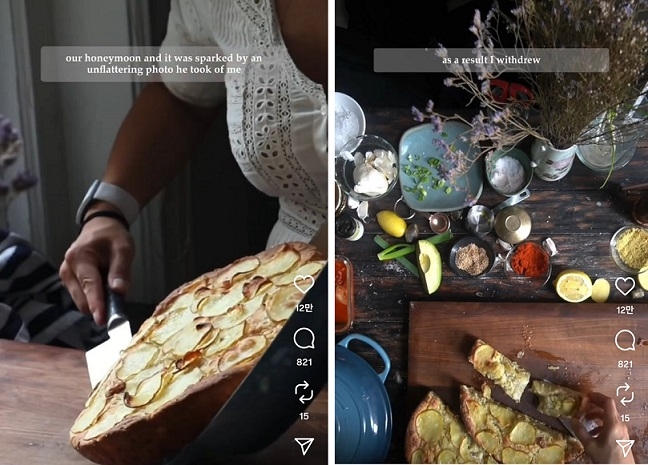 One of Molinaro’s Instagram videos shows her making potato bread while reflecting on a fight with her husband during their honeymoon and sharing her thoughts on appearances. (Instagram @thekoreanvegan)
One of Molinaro’s Instagram videos shows her making potato bread while reflecting on a fight with her husband during their honeymoon and sharing her thoughts on appearances. (Instagram @thekoreanvegan)
“You’ll ask yourself, maybe if I just did this, or maybe if I didn’t do that, we’d still be friends. But here’s the thing, babe, and I need you to listen, because this one’s gonna be really hard. It’s them. It’s not you,” she adds.
It’s one of the cooking videos that has racked up millions of views, created by Joanne Lee Molinaro, a 46-year-old Korean American food content creator widely known as “The Korean Vegan,” who has 3 million followers on TikTok and 1.06 million on Instagram.
Her posts are more than just about vegan cooking. In another video that has drawn 2.35 million views on her Instagram as of Oct. 22, she bakes potato bread while sharing a story about a fight she had with her husband on their honeymoon, born from her insecurity about her appearance.
The vivid visuals of rich sauces and sizzling pans pull viewers in, while her calm, resonant voice touches on everything from relationships to love and even politics.
Molinaro adopted a vegan diet in 2016, inspired by her Italian husband who had gone vegan for health reasons. She began sharing plant-based recipes on her blog the same year.
When the COVID-19 pandemic hit in 2020, she turned on her camera to ease the isolation by cooking and telling stories, which marked the beginning of The Korean Vegan.
For her, sharing personal stories in her cooking videos felt natural, much like conversation at a dinner party, flowing from the food to everyday life: a news article someone read, a funny story from a parent or something interesting that happened that day.
“When you go to a dinner party, you enjoy the food, but your host isn’t regaling you with every detail of how she made it,” she explained in an email interview with The Korea Herald.
“I shared stories from my life as if I were hosting a dinner party, but I never imagined so many people would enjoy them.”
Her stories revealed the deepest corners of her life, from her nine-year marriage to her college sweetheart that ended in divorce and remarriage to her current husband, to the story of her parents who were born in North Korea and fled to South Korea as children.
‘Korea comes first, then vegan’
For this second-generation Korean immigrant, food and family have always been tangled together, shaping how she understands her parents, navigates society, and defines her Korean identity.
“We feel our identity challenged every single day. For some people, that means they’ll avoid Korean food, Korean language and other parts of their parents’ culture to blend in with American culture. But for some of us, it means we want to invest even more in our heritage, because we feel it threatened,” she said.
She was born in Chicago to parents who escaped North Korea during the Korean War, met and married in Seoul, and immigrated to the United States in the 1970s.
“(Korean immigrants) want to preserve what our parents brought with them to the US. The easiest and most delicious way to do that, of course, is food. It is a source of identity and anchoring,” she added.
 A childhood photo of Molinaro playing with her mother. Her parents fled North Korea as children with their families and later immigrated to the United States in the 1970s. (Joanne Lee Molinaro)
A childhood photo of Molinaro playing with her mother. Her parents fled North Korea as children with their families and later immigrated to the United States in the 1970s. (Joanne Lee Molinaro)
After going vegan, she realized that Korean cuisine was a natural match for a plant-based diet, with its rich variety of soybean-based fermented foods such as doenjang (soybean paste) and cheonggukjang (fermented soybean stew), along with various seasoned vegetable side dishes.
“At that time, it was very hard to find vegan kimchi or other side dishes at Korean grocery stores or restaurants, so I started making them myself. It turned out to be so much fun, and not nearly as hard as I thought it would be,” she said.
Her recipes reinterpret traditional Korean cuisine through a vegan lens, swapping the fish sauce used in stews for a plant-based version made from soybeans and seaweed.
Yet her true passion lay not in veganism, but in Korean food itself.
“I care about sharing Korean food, period. My target audience are people who don’t know much about Korean food but want to try, or people who grew up eating Korean food but don’t know how to make it like I used to be,” she said.
“For Korean people, I want to show them, too, that it isn’t that hard to incorporate healthier choices into their Korean favorites.”
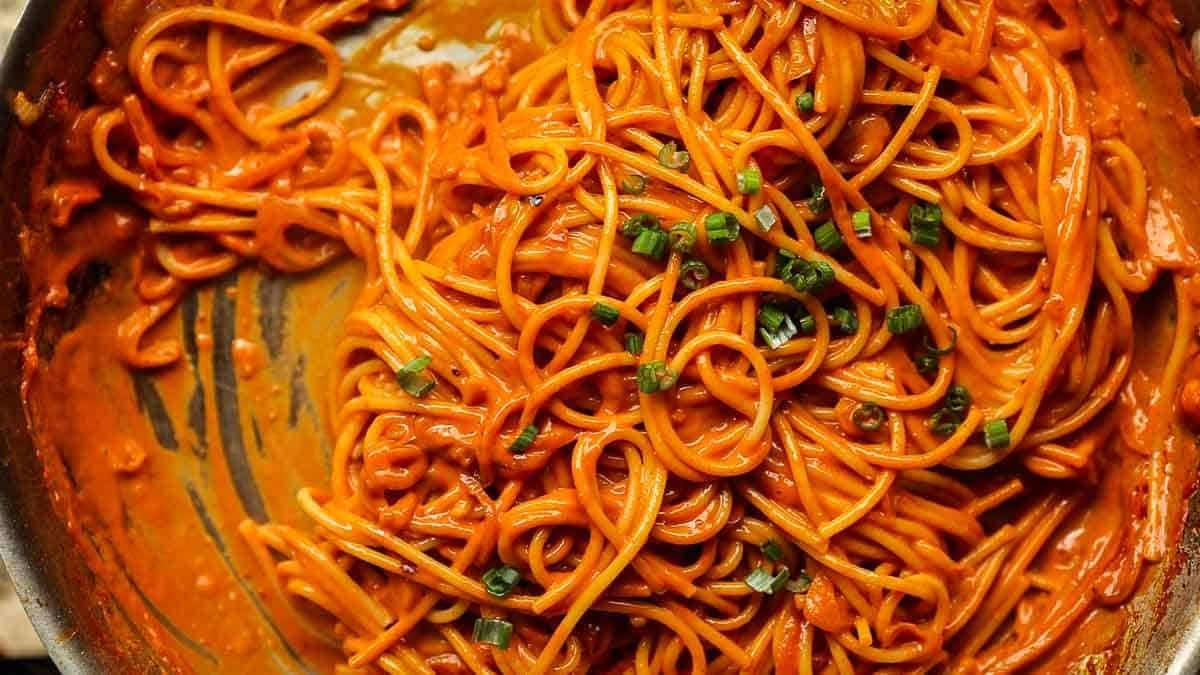 A photo of Molinaro’s vodka pasta made with gochujang (thekoreanvegan.com)
A photo of Molinaro’s vodka pasta made with gochujang (thekoreanvegan.com)
Influenced by her multicultural background, Molinaro blends elements of Western and Japanese cooking into her vegan Korean cuisine.
“I really like my kimchi jjigae chili. I love chili so much. One day, I thought it might taste so good if I added kimchi, gochugaru (chili powder), and gochujang (chili paste) to it. And it was perfect. It’s also very healthy — tons of vegetables, beans, and of course, kimchi,” she said.
Among her fusion vegan creations inspired by Korean flavors is a pasta that reimagines the classic bolognese with gochujang, a lentil soup infused with doenjang that evokes Mediterranean cuisine, and a Korean twist on the traditional Philly sandwich made with bulgogi-style seasoning.
From lawyer to TikTok star
Now a social media influencer with more than 5 million followers across platforms, she was, just a few years ago, a corporate lawyer in Chicago with nearly two decades of experience.
“I pursued law because I was so anxious about my financial security. In retrospect, I think I internalized my parents’ fear of poverty. Both of them were refugees from North Korea during the war and suffered many years of destitution. I unconsciously inherited that fear, and as a result, when I graduated college, all I could think about was ‘I need to make as much money as possible,’” she said.
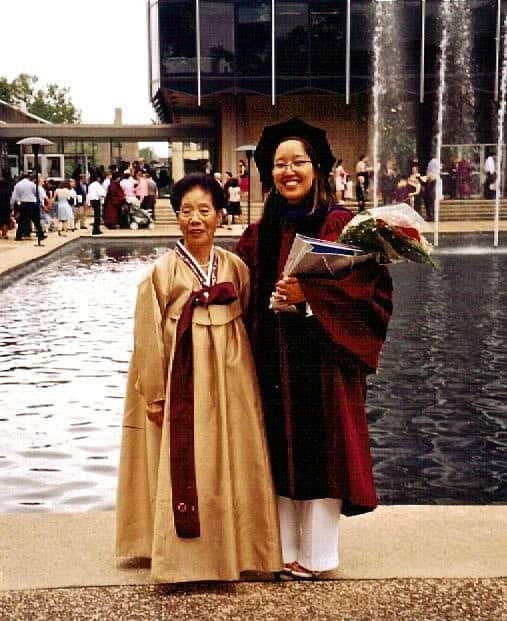 Molinaro and her mother pose for a photo during her graduation ceremony at the University of Chicago Law School in 2004. (Joanne Lee Molinaro)
Molinaro and her mother pose for a photo during her graduation ceremony at the University of Chicago Law School in 2004. (Joanne Lee Molinaro)
At 21, this anxiety drove her to set aside her dream of becoming a writer and instead go to law school at the University of Chicago in 2001. Four years later, she passed the bar exam and began her career at one of the city’s leading law firms.
Little did she know that her vegan lifestyle would one day rekindle the dream she had once set aside.
Buoyed by her online success, she published “The Korean Vegan Cookbook: Reflections and Recipes from Omma’s Kitchen” in 2021.
The book earned her the title of best-selling author as it debuted at No. 3 on The New York Times Best Seller list shortly after its release, where it remained for a week. The following year, she won the James Beard Media Award in the cookbook category.
“Life doesn’t end when you’re 25 or 35 or 45. Now some people will say I fought for my dream job. No, I fought for me. I fought for that 21-year-old girl who didn’t believe in herself to prove to her that she was worth every single bit of it,” she said in one of her videos.
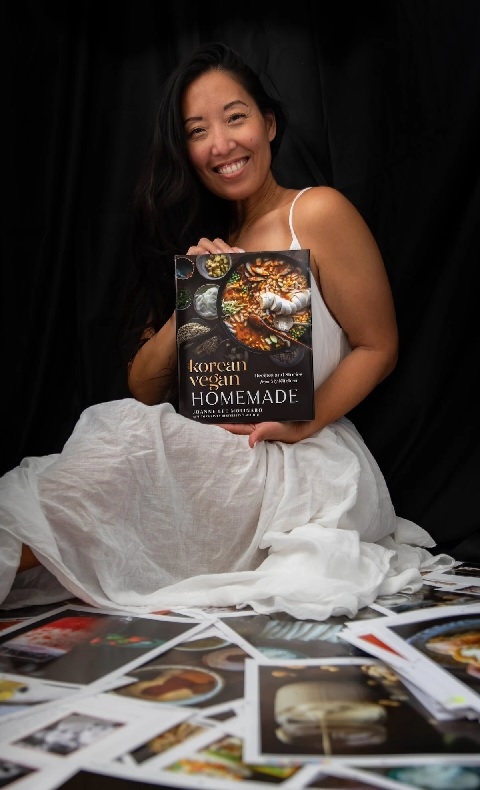 Joanne Lee Molinaro, a TikTok star with 3 million followers known as “The Korean Vegan,” who shares vegan Korean recipes and powerful personal stories, recently released her second cookbook, “The Korean Vegan Homemade.” (Courtesy of Joanne Lee Molinaro)
Joanne Lee Molinaro, a TikTok star with 3 million followers known as “The Korean Vegan,” who shares vegan Korean recipes and powerful personal stories, recently released her second cookbook, “The Korean Vegan Homemade.” (Courtesy of Joanne Lee Molinaro)
She recently published her second cookbook, “The Korean Vegan Homemade,” featuring more than 100 plant-based recipes — many of them traditional Korean dishes fused with American and Italian staples — through which she continues to tell life stories through food, just as she always has.
“I am no longer practicing as a lawyer. I am now a writer and content creator full-time. But I really enjoy contributing to the news and writing about the law. I might end up writing a book about it one day,” she said.
cjh@heraldcorp.com

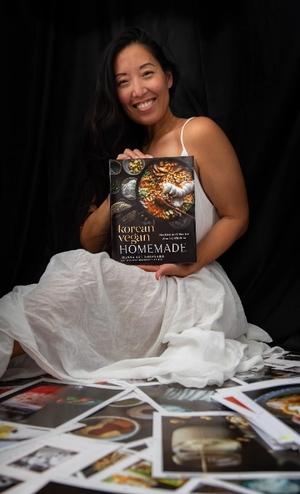
Dining and Cooking